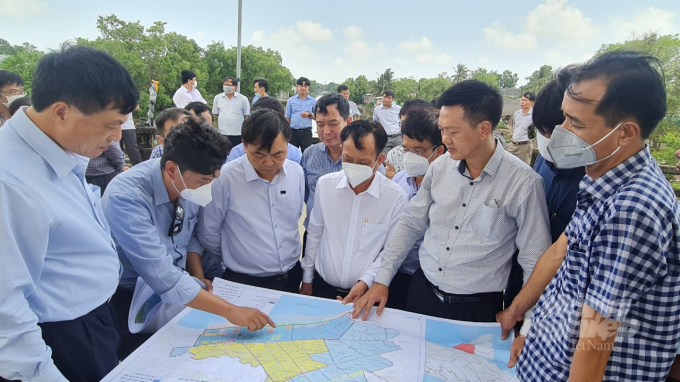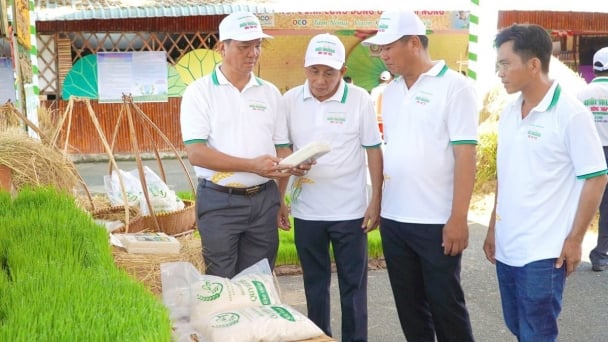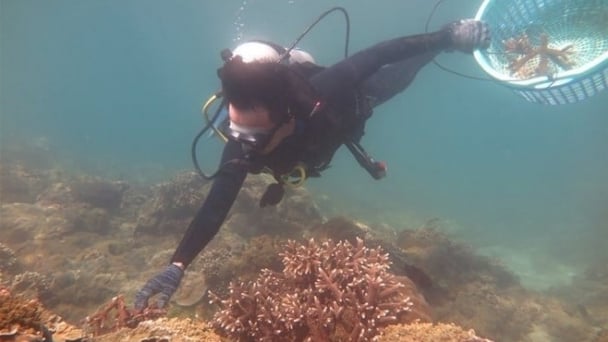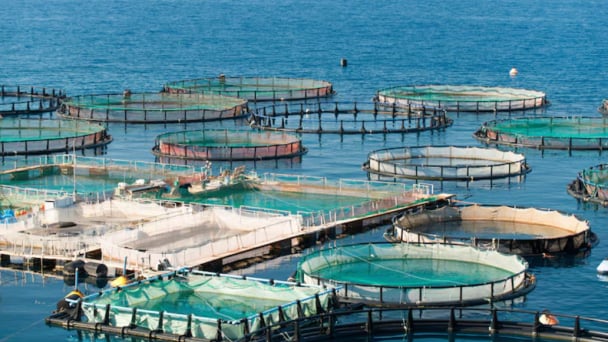June 8, 2025 | 15:03 GMT +7
June 8, 2025 | 15:03 GMT +7
Hotline: 0913.378.918
June 8, 2025 | 15:03 GMT +7
Hotline: 0913.378.918

Deputy Minister Nguyen Hoang Hiep and the delegation survey the site of the project "System of works to regulate and replenish water for aquaculture in the south of National Highway 1A, Bac Lieu province". Photo: Trong Linh
A delegation of the Ministry of Agriculture and Rural Development led by Deputy Minister Nguyen Hoang Hiep on April 18 had a working session with the People's Committee of Bac Lieu province on the project "A system of works to regulate and supplement water for aquaculture in the south of National Highway 1A, Bac Lieu province". The project has been approved by the ministry with a total capital of more than VND1.5 trillion.
This is a very important project for the socio-economic development of Bac Lieu province in the period of 2022 - 2025, with a vision to 2030-2050. The project's beneficiary area includes a part of Bac Lieu City and districts of Vinh Loi, Hoa Binh and Dong Hai and Gia Rai town. The total area is more than 63,000 hectares, including more than 43,000 hectares of aquaculture.
The proposed construction solutions are self-flowing water transfer combined with pumping and closing the project area by tidal control sluices. Accordingly, two sluice gates will be built at Vam Leo and Ho Phong, and nine open sluices will be built on the east bank of Ho Phong - Ganh Hao canal. The project also includes the repairing and upgrading of Cau Sap sluice and the construction of Cau Sap pumping station.
The project will faciliate the fresh water transfer from the North of National Highway 1A to the Southern of the highway to dilute the water source to ensure aquaculture for an area of 46,300 ha.
At the same time, under the project, saltwater would be minimised before the time of sowing to serve rice cultivation for the area of about 15,000 hectares of rice-shrimp area.
The project will enhance the ability to exchange water sources, actively remove polluted water, supply sea water of good quality, contributing to reducing water pollution in the river and canal system that provide water for aquaculture. It also helps reduce flooding, protect infrastructure against negative impacts of nature, reduce groundwater exploitation, land subsidence, sea level rise.
It is also expected to support water drainage to reduce flooding for the North National Highway 1A area in Bac Lieu province with an area of about 42,000 ha.
Deputy Minister Nguyen Hoang Hiep said that Bac Lieu province was assigned by the Prime Minister to become the centre of the country's shrimp industry. To realise it, there must be good irrigation infrastructure.
In the past time, the Ministry of Agriculture and Rural Development invested in many irrigation projects in the province such as Ninh Quoi boat dock, Ganh Hao fishing port, Bac Lieu high-tech agricultural application and shrimp development area.
With the project "System of works to regulate and supplement water for aquaculture in the south of National Highway 1A, Bac Lieu province" which is about to be implemented, Bac Lieu province will be more proactive in water sources for production in both regions - North and South Highway 1A.
However, because there are many different opinions, the Ministry of Agriculture and Rural Development want to learn more opinions from local authorities, professional agencies and scientists.
Translated by Hien Anh

(VAN) Dong Thap has launched a meeting in response to the Action Month for the Environment under the theme 'Live Green - Join Hands for a Green Economy' at Tram Chim National Park.

(VAN) The ocean has the capacity to absorb millions of tons of carbon, provided that mangrove forests, coral reefs, and biodiversity are protected.

(VAN) Technology is redrawing the map of Vietnamese aquaculture: more modern, greener, and more sustainable.

(VAN) Novel process harnesses machine learning to reveal groups of genes that determine how efficiently plants use nitrogen.

(VAN) Several scientists and farmers are experimenting with soil treatment in some key durian-growing regions such as Cai Lay (Tien Giang), Dak Song, Gia Nghia, and Dak R’lap (Dak Nong).
/2025/05/25/4127-3-073637_820.jpg)
(VAN) Thanks to the promotion from an FAO-implemented project, vegetable production in greenhouses in Moc Chau has seen strong development, from 1.5 hectares in 2021 to nearly 50 hectares in 2024.

(VAN) FAO has recently supported USD 140,000 to implement the project 'Risk mitigation human-animal interface risks through disease control initiatives in pig farming.'